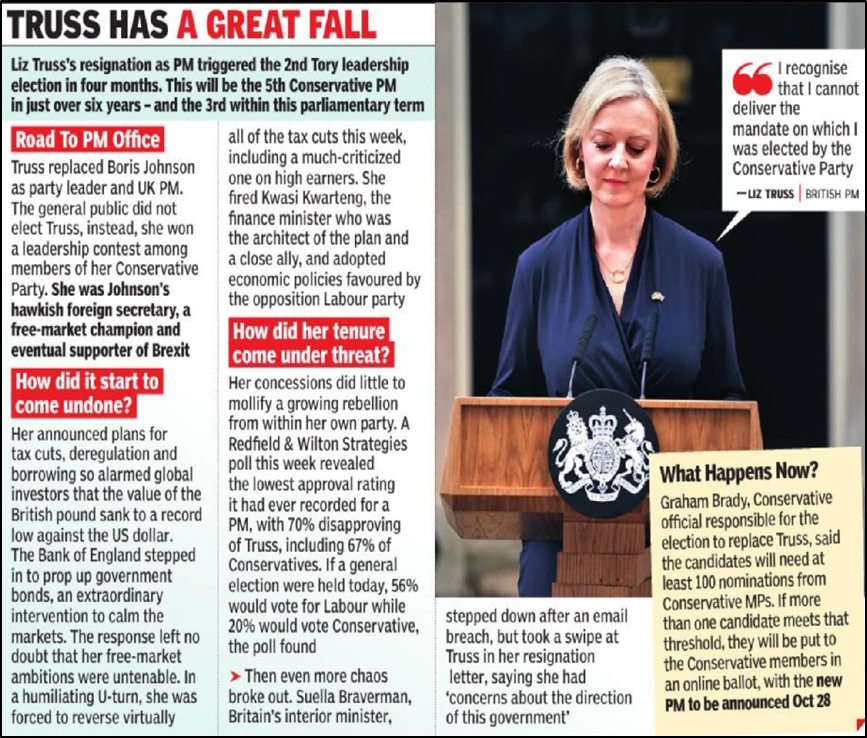In News:
- Britain is about to get its third Prime Minister in three months, with Prime Minister Liz Truss announcing that she will quit the post.
- She faced growing pressure from Conservative MPs to quit after her government presented its now infamous mini-Budget.

What’s in Today’s Article:
- Electoral System of UK
- News Summary
Electoral system of UK
- The UK is divided into 650 constituencies and each constituency is represented by one MP elected in the House of Commons (the UK’s lower chamber of parliament).
- It follows first past the post system to decide the winner in each constituency.
- The members of the upper chamber of the parliament, the House of Lords, are not elected. The King on the advice of the prime minister appoints them.
- To govern, a winning party needs to win more than half of the 650 seats.
- The leader of the winning party is appointed by the King as prime minister and forms a Cabinet of senior politicians.
Process of finding a successor after the PM resigns
- This process of finding a successor after the resignation of the PM is overseen by the 1922 Committee.
- The 1922 Committee, also known as "the 22", is a committee of all backbench Conservative MPs that meets weekly when the Commons is sitting.
- Its chair, usually a senior MP, is elected by committee members and has considerable influence within the Parliamentary Party.
- The Committee serves as a link between rank-and-file Conservative MPs and party leadership.
- The process of finding a successor works as following:
- Candidates putting themselves forward for the leadership must be nominated by certain number of Conservative lawmakers.
- Officer responsible for the election to replace Truss has announced that the Candidates will need at least 100 nominations from Conservative MPs to become a contender in this race.
- Currently, Graham Brady is the Chairman of the powerful 1922 Committee which will oversee the process.
- If more than one Candidate meet the threshold, an election will be held.
- Conservative lawmakers then hold several rounds of votes to whittle down the number of candidates.
- Each time they are asked to vote for their favoured candidate in a secret ballot, and the person with the fewest votes is eliminated.
- The final two candidates are then put to a postal ballot of the wider Conservative Party membership, with the winner named the new leader.
- The leader of the party with a majority in the House of Commons is the de facto Prime Minister.
News Summary
- The Prime Minister Liz Truss has been forced to resign following a rebellion within her Conservative Party. Truss is now the shortest-serving PM in British history.
Reasons
- The mini-Budget
- After becoming the PM, her government, presented a mini-Budget that essentially ramped up spending while also cutting tax revenues.
- This set-in motion a chain of events that ultimately caused her downfall.
- Market reaction
- The mini-Budget spooked market participants because a sharp rise in borrowings at a time when the UK’s growth prospects have been doubtful.
- It implied that the government may not be able to repay the debts it accumulated.
- In a panic reaction, investors started selling all possible UK assets.
- As such, the pound sterling fell to historic lows against the US dollar; worsening the imported inflation in the process because it made imports costlier.
- Similarly, investors, unwilling to lend money to the UK government, started selling gilts (government bonds).
- Within no time, the Bank of England had to step in to stop a financial collapse.
- Crisis in pension funds and mortgage rates
- A direct result of the mini-Budget and the fall in gilt prices (and a rise in gilt yields) was the crisis it set off in the pension funds in the UK.
- The situation created massive panic and genuine doubts over the viability of the pension funds.
- A sharp rise in market interest rates also meant that those with home loans had to either refinance or risk losing their homes.
- Prospective owners found that a new loan was considerably costlier within no time.
- U-turn upon U-turn
- As it became clear that the markets would continue to punish UK assets unless Truss realised her mistake, the PM reluctantly started announcing U-turns.
- The biggest blow came when she sacked her chancellor.
- This raised the obvious political question: why did Truss deserve to stay in office when she fired Kwarteng just for voicing Truss’ economic plans?
- The new chancellor
- The last nail, came in the form of the actions of the newly appointed chancellor Jeremy Hunt.
- As soon as he took charge, he ripped apart everything that was left of Truss’s agenda.










